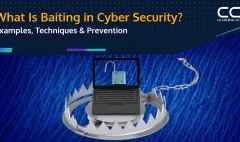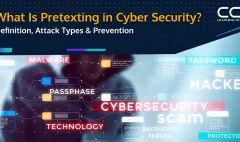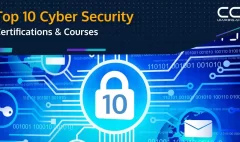Looking For A Career Change? Our Cybersecurity Bootcamp Program Can Make It Happen!
To say that the COVID-19 outbreak has impacted our lives is an understatement. As of 2021, the world is still suffering the effects of social isolation and lockdowns, as well as severe changes in the workforce that impact millions.
Unfortunately, hackers and fraudsters have been hard at work during the crisis and while the world recovers. Remote work is a huge opportunity for hackers as it increases screen usage and cloud computing. However, the pandemic was not a one-off occurrence. Cyber crime is on the rise and isn’t slowing down.
30,000 websites are hacked every day, and a new attack is launched somewhere on the Internet every 39 seconds.
To engage its people, governments, businesses, and other organizations require trustworthy cybersecurity policies. Global e-commerce sales are expected to exceed $3.53 trillion, with a growing proportion of government operations taking place online. Rogue hackers and state-sponsored attacks pose a threat to our increased reliance on digital services. Because of the severity of the situation, top cybersecurity experts are in high demand.
Why are Cybersecurity Jobs Growing at Such a Fast Pace?
Newcomers to the cybersecurity field construct digital barriers and traps to protect critical data. National and international businesses aren’t the only ones coping with cyber threats. Almost 66% of small organizations did not respond appropriately to data breaches.
Cybersecurity professionals aren’t just patching up old systems; they’re designing new ones from the ground up. That’s why the top cybersecurity bootcamp programs are becoming so popular.
Software and cloud solutions must be complemented by extensive instruction and best practices that are tailored to the specific demands of an organization. Professionals who change careers in cybersecurity fill critical gaps in both the public and private sectors.
When you decide to move into cybersecurity, you’re choosing to protect the general public from the most elusive and destructive adversaries.
You’ve chosen to make a difference in your communities by ensuring that those around you may safely use the internet and favorite devices.
How Do I Transition to Cybersecurity?
You’re probably wondering, “How do I move my career to cybersecurity?” Professionals in other tech fields can make the switch easily. The favorable work market, above-market pay, and prospects for advancement make the effort worthwhile.
Skills that transfer to cybersecurity can be found in a variety of jobs, from law enforcement to software development. Technical abilities can be learned in graduate programs and are usually required for advanced cybersecurity positions. Changes in cybersecurity careers are feasible with a master’s degree in cybersecurity and a desire to learn new technology.
However, in today’s market, a four-year or advanced degree isn’t always necessary to get in the cybersecurity door. Many employers are hiring based on knowledge and experience, which means you can enter the field after completing a professional development program, like tech bootcamps.
What Types of Skills Do You Need to Work in Cybersecurity?
Moving into cybersecurity does require certain specific skills. These boil down to strategic mindset, strong communication capabilities, and attitude of life-long learning.
Communication
Every cybersecurity worker must know how to communicate and be an active listener, whether it’s with their team, clients, or stakeholders. You also need to be able to articulate to others why particular protocols are required and how to manage them on an individual basis.
Strategy
To grasp how to apply security measures, consider the repercussions of any action, and comprehend the thoughts of a hacker, you’ll need a critical mind. Wherever you are in your cybersecurity career, approaching your work strategically helps establish yourself as a trustworthy leader. Ethical hacking and game theory are excellent avenues to improve this skill.
Learning For a Lifetime
Cyber threats are omnipresent, and they’re getting more sophisticated all the time. Cybercriminals and hackers force cybersecurity experts to stay on top of new advancements, which means they must schedule time for research, upskilling and reskilling, and gaining industry-standard certifications. If you’re naturally inquisitive, a career in cybersecurity might be right for you!
Additional Capabilities
Of course, there are a variety of hard and soft talents that can be used to supplement the fundamental three listed above. The following is not an exhaustive list, but it can help you get a sense of where to begin if you have no prior expertise in the industry.
Soft Skills
- Problem-solving
- Detail oriented
- Collaborative
- Team leadership
- Creative research
Hard Skills
- Error handling and the file system
- Networking and network attacks
- Security Information and Event Management
- Industrial IoT
- Endpoint protection
- Python automation
Moving From Information Technology to Cybersecurity
The most obvious candidates for a career transition into cybersecurity are IT experts. Jobs in the IT area range from in-house support to network engineering. Although cybersecurity is frequently lumped in with IT, there are significant gaps to fill during job transitions.
Support personnel, technicians, and engineers are worried about how the data in their system works for end-users. Security is one of the dozens of factors that a company’s IT team examines, along with efficiency and operational costs. When it comes to system security, IT professionals examine internal passwords, permissions, and data storage.
The cybersecurity field considers the overall security of a system against external threats. When switching jobs to cybersecurity, experienced IT workers learn about risk management and external defenses.
Moving From a Military Career to Cybersecurity
Veterans are a good fit for cybersecurity. Because of technological advancements in this field, troops and police officers are able to apply the most up-to-date innovations in their work. Professionals in this sector are familiar with the changing nature of technology, from drones to advanced forensic tools.
Security clearances and the management of sensitive data are required in these sectors.
Non-technical skills are developed by police and military personnel, which are essential for cybersecurity career success. When it comes to determining the origins of internet attacks, investigative skills and expertise with criminal conduct are advantageous. Following attacks on clients and businesses, precise forms of communication from military experience helps career changers to swiftly determine the next steps.
Start Your Cybersecurity Career with an Online Cybersecurity Bootcamp
Even if you have no prior experience in cybersecurity – or in technology in general – you can still get into the cybersecurity field. How? With the CCS Learning Academy’s Cybersecurity Specialist Bootcamp program.
This intense 8-week course teaches you everything you need to enter the cybersecurity field. From the start, you’ll be trained by cybersecurity experts who understand the security demands and challenges in today’s market.
When you graduate from Cybersecurity Specialist Certification Bootcamp, you’re ready for the following positions:
- Cybersecurity Specialist/ Consultant
- Information Security Specialist
- Information Systems Security Manager
- Site Security Administrator
- Security Analyst
- Security Engineer
- Security Architect
- Security Software Developer
- Cryptographer
- Cryptanalyst
And bonus! We’ll help you find a job after graduation.
Ready to get started? Click Here to apply now!







